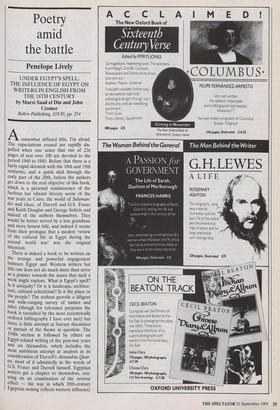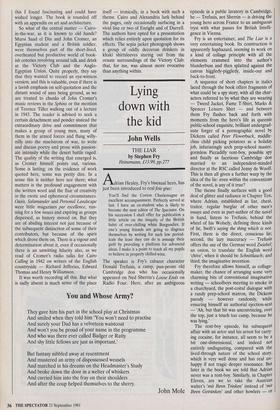Poetry amid the battle
Penelope Lively
UNDER EGYPT'S SPELL: THE INFLUENCE OF EGYPT ON WRITERS IN ENGLISH FROM THE 18TH CENTURY by Mursi Saad el Din and John Cromer Bellew Publishing, £18.95, pp. 254
somewhat inflated title, I'm afraid.
A
The expectations roused are rapidly dis- pelled when one notes that out of 236 pages of text over 100 are devoted to the period 1940 to 1945. Before that there is a fairly rapid skirmish with the 18th and 19th centuries, and a quick skid through the early part of the 20th, before the authors get down to the real objective of this book, which is a personal reminiscence of the factious but vibrant literary scene of the war years in Cairo, the world of Salaman- der and Oasis, of Durrell and G.S. Fraser and Keith Douglas and George Seferis and indeed of the authors themselves. They would be better served by a less grandiose and more honest title, and indeed it seems from their prologue that a modest 'review of the cultural life in Egypt during the second world war' was the original intention.
There is indeed a hook to be written on the strange and powerful engagement between Egypt and Western writers but this one does not do much more than serve as a pointer towards the issues that such a work might explore. What is Egypt's spell? Is it antiquity? Or is it landscape, architec- ture, cultural eclecticism? Is it the place or the people? The authors provide a diligent and wide-ranging survey of names and titles (though for reference purposes the book is tarnished by the most eccentrically ordered bibliography I have ever met) but there is little attempt at literary discussion or pursuit of the theme in question. The 1940s section is followed by others on Egypt-related writing of the post-war years and on Alexandria, which includes the most ambitious attempt at analysis in its consideration of Durrell's Alexandria Quar- tet, most of it admittedly in the words of G.S. Fraser and Durrell himself. Egyptian writers get a chapter to themselves, cen- tring on an examination of the reverse effect — the way in which 20th-century Egyptian writing reflects western influence;
this I found fascinating and could have wished longer. The book is rounded off with an appendix on art and architecture.
So what of the central matter — Cairo- in-the-war, as it is known to old hands? Mursi Saad el Din and John Cromer, an Egyptian student and a British soldier, were themselves part of the short-lived, overheated but productive world of book- ish coteries revolving around talk and drink at the Victory Club and the Anglo- Egyptian Union. Quite properly, they say that they wanted to record an eye-witness version, and this is valuable, even if there is a lavish emphasis on self-quotation and the distant sound of axes being ground, as we are treated to chunks of John Cromer's music reviews in the Sphinx or the mention of Terence Tiller walking out of a lecture in 1943. The reader is advised to seek a certain detachment and ponder instead the extraordinary drive and commitment that makes a group of young men, many of them in the armed forces and flung willy- nilly into the maelstrom of war, to write and discuss poetry and prose with passion- ate intensity while the desert battle raged. The quality of the writing that emerged is, as Cromer himself points out, various. Some is lasting; on the evidence of work quoted here, some was pretty dire. In a sense this is neither here nor there; what matters is the profound engagement with the written word and the flair of creativity in the exotic and ephemeral circumstances. Oasis, Salamander and Personal Landscape were little magazines par excellence, run- ning for a few issues and expiring as groups dispersed, as history moved on. But they are of abiding interest not just because of the subsequent distinction of some of their contributors, but because of the spirit which drove them on. There is a vigour and determination about it, even if occasionally there is an unwitting hilarity also, as we read of Cromer's radio talks for Cairo Calling in 1942 on writers of the English countryside — Richard Jefferies, Edward Thomas and Henry Williamson.
It was worth recording all this. But what is sadly absent is much sense of the place itself — ironically, in a book with such a theme. Cairo and Alexandria lurk behind the pages, only occasionally surfacing in a vivid line or two of Enright and of Durrell. The authors have opted for a presentation which relies entirely upon quotation for its effects. The sepia jacket photograph shows a group of oddly decorous drinkers in khaki shirtsleeves staring out from the ornate surroundings of the Victory Club: that, for me, was almost more evocative than anything within.



























































 Previous page
Previous page